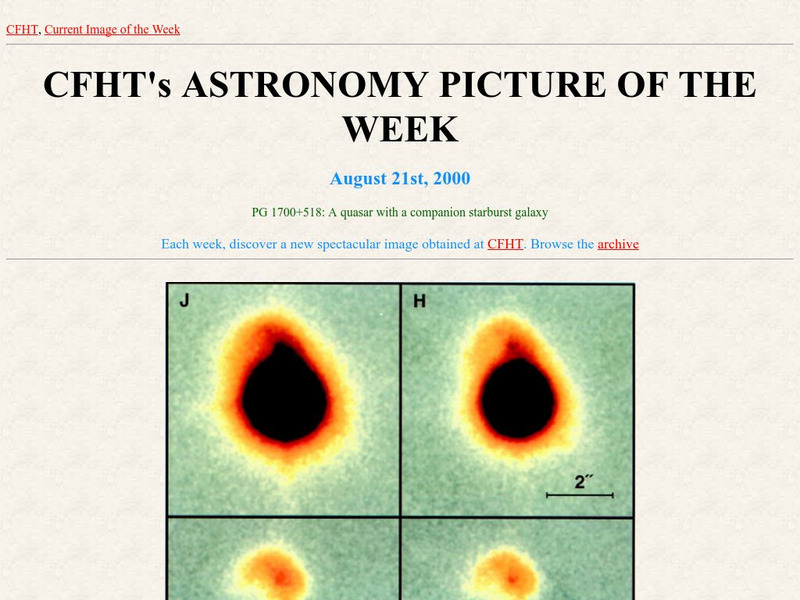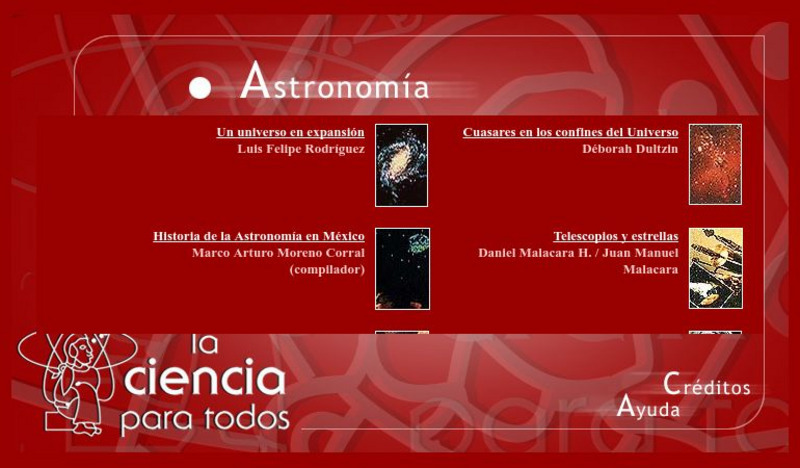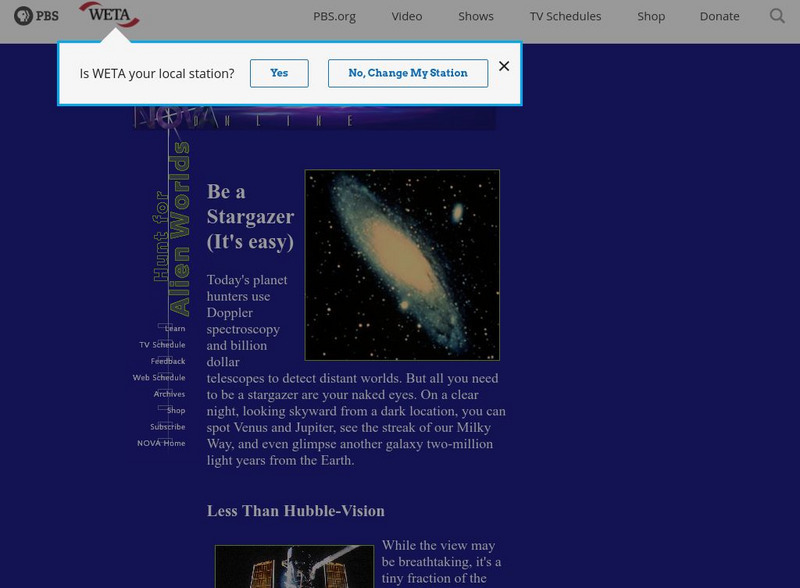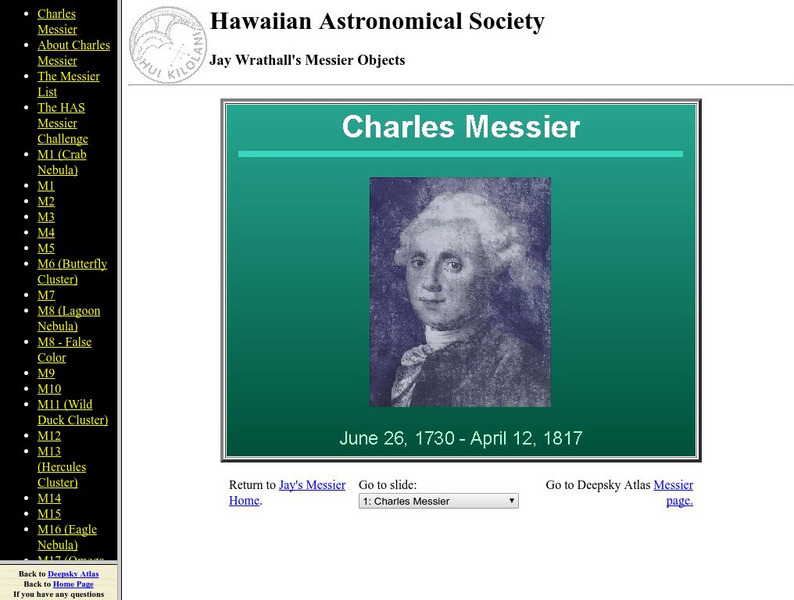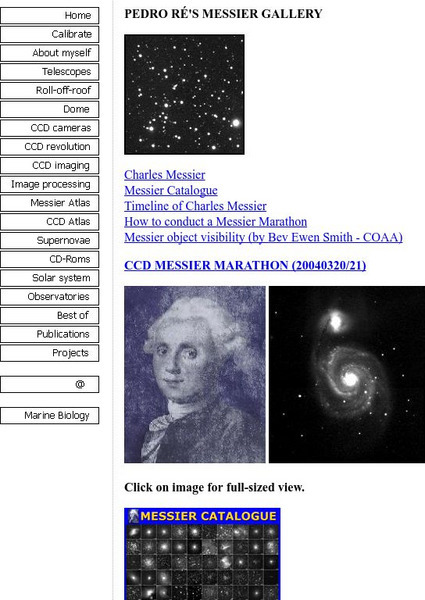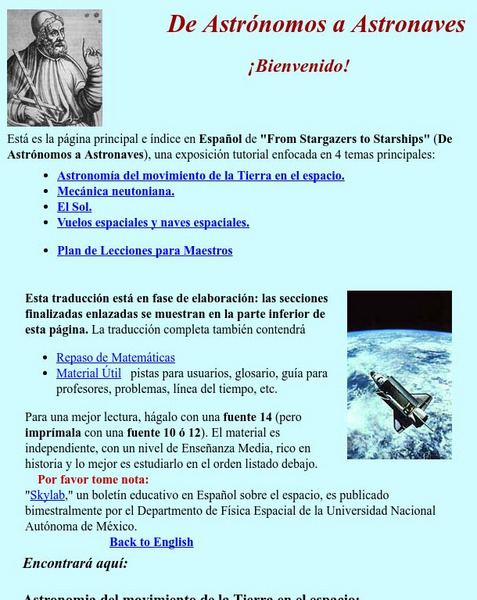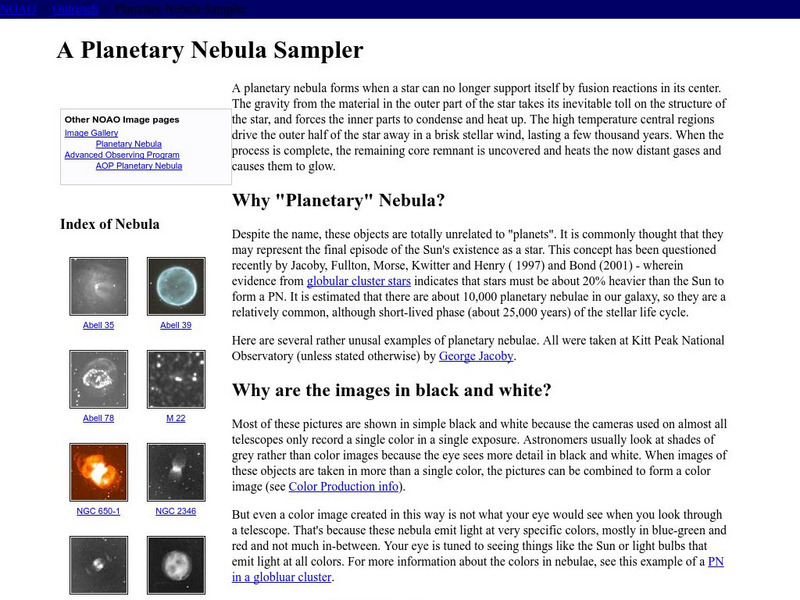University of Wisconsin
The Why Files: Infra Red Eye Special
A description of the ways in which infra-red is used in astronomy, including an extended example describing how infra-red was used to learn about Pluto's moon, Charon. There are also links to other sites of astronomical interest.
Ministerio de Educación (Spain)
Ntic: Astronomia Visible
In this site you can learn about stars, planets, satellites and a little history of Astronomy.
University of Hawai'i
University of Hawaii Cfht: Quasars
Provides basic information related to quasars.
Wikimedia
Wikipedia: Timeline of Solar System Astronomy
This site from the encyclopedia Wikipedia provides an in-depth timeline of important events in astronomy relating to the solar system are presented here. Links are also provided for additional information on related subjects.
Instituto Latinoamericano de la Comunicacion Educativa
La Ciencia Para Todos: Astronomia
In this site you will find several Astronomy topics such as: the expansion of the Universe, history of Astronomy in Mexico, quasars in the confine of the Universe and telescopes and stars.Read phonetically
PBS
Pbs: Discovery of Quasars 1960
PBS offers a brief history of the discovery of quasars and the people involved.
California Institute of Technology
Cal Tech: Two Micron All Sky Survey
Learn about the Two Micron All Sky Survey project, in which telescopes and observatories scan the sky for infrared radiation in order to learn more about the Milky Way galaxy. The infrared spectrum is described and its importance to...
PBS
Pbs: Nova Online: Be a Stargazer
This resource briefly describes how telescopes work and provides helpful tips for stargazing.
PBS
Star Map
This star map has five different constellations along with four newly discovered solar systems. If you are located in the northern hemisphere you can use this resource to locate stars.
Trinity College Dublin
The History of Mathematics: Roemer
A short biographical sketch of the life and work of Ole Roemer (1652-1719 CE). Identifies his scientific discoveries and contributions in astronomy.
Christian Science Monitor
Christian Science Monitor: The Map of the Millennium
This article from the Christian Science Monitor explores the impact of key astronomical discoveries of the past millennium on science and religion.
Other
Astrolabe.org: The Astrolabe
A description of the ancient astrolabes and how they worked. Provides information about definitions, collections, and also includes photos.
Other
Sky Server: Galaxies
SkyServer explains and presents images of spiral galaxies, elliptical galaxies, irregular galaxies, galaxy clusters, galaxy collisions and the like.
Other
The Ptolemaic Model of the Planetary System
An easy-to-read description and history of Ptolemy's geocentric model of the universe. Geocentric means that Ptolemy believed the Earth was the center of the universe.
Other
The Astrolabe: Home Page
This site provides a very general overview of astrolabe principles with links to other pages for more detailed information.
Space Telescope Science Institute
The Hubble Heritage Project: Crab Nebula
A picture of the Crab Nebula and accompanying text.
Other
Has: Charles Messier
Brief, concise facts about Charles Messier and his catalog of comets, galaxies, and other astronomical bodies. Included are photographs of each of the 110 objects listed in his catalog.
Other
Pedro Re's Messier Gallery
Are you looking for information on Charles Messier? This site includes a detailed biography of his life along with a timeline, how to conduct a Messier Marathon, and photographs of the astronomical objects in Messier's catalog.
Other
Kid Power: Astronomy for Kids
Young children can find facts about the Solar System, the Sun, meteorites, stars, galaxies, planets, our moon, comets, asteroids, and space exploration. Pages offer clear photos and bullet-point information, which is easy to read and...
Other
Phy6: De Astronomos a Astronaves
This site contains four main categories: Astronomy of the Earth's motion in space, Newtonian mechanics, the sun and spaceflight and spacecraft.
Other
Nine planets.org: Ptolemy
This site from the University of Arizona provides a background of Ptolemy's profound influence in the areas of astronomy, geography, and cartography. Includes good pictures and related links.
Other
National Optical Astronomy Observatory: A Planetary Nebula Sampler
A planetary nebula forms when a star can no longer support itself by fusion reactions in its center. This NOAO site is also illustrated.
Other
Christopher Crockett: The Astronomy Word of the Week Is "Barycenter"
While astronomers and philosophers have long mused on the possibility of other solar systems, the first planets confirmed to orbit a star other than our Sun weren't found until 1992. The reason it took so long is that it's really hard!...
Enchanted Learning
Enchanted Learning: Zoom Astronomy
Where is our Solar System? How far away is the sun? What makes up the sun? Find out all you want to know about our solar system. This is a comprehensive on-line site about space and astronomy. Check out all of the excitement!


